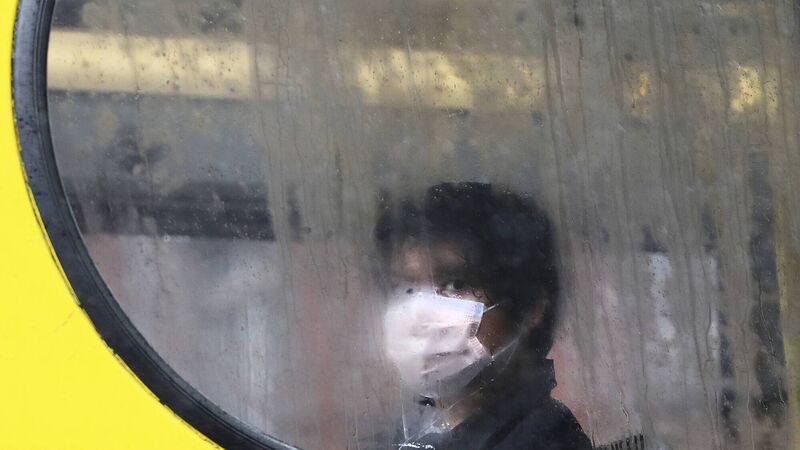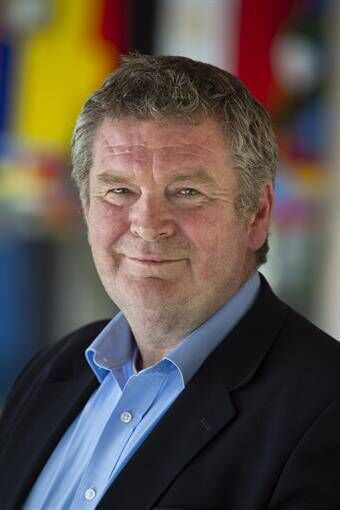Wearing of masks likely to continue for 'very long time' as Monday reopening given green light

A person wearing a face mask on a bus in Dublin
The Irish doctor leading the World Health Organisation’s (WHO’s) response to Covid-19 has warned the wearing of face coverings will likely continue for a "very long time" as he warned Europe is still seeing a million cases of Covid-19 a week.
Appearing at a virtual conference hosted by NUI Galway today, Dr Mike Ryan said that despite the success of vaccine programmes, the use of masks to curb the spread of the virus “will probably extend for a very, very long time."
Dr Ryan's comments come as Tánaiste Leo Varadkar tweeted on Saturday that the next stage of reopening the country under the Government’s plan to phase out Covid restrictions is “ok” to go ahead on Monday.
Under the next phase of unwinding pandemic restrictions, indoor events can take place with 60% venue capacity provided all attendees are immune, meaning they are either fully vaccinated or have recovered from Covid-19 within the previous six months.
Cinemas and theatres will have the same capacity limit under the same rules.
Outdoor events with fully vaccinated patrons will see a capacity of 75% allowed while the capacity limit will be 50% for outdoor events with a mix of vaccinated and unvaccinated people.
Live music is also set to make a comeback at Irish pubs and weddings.

Speaking today, Dr Ryan said people “deserve” to hope and feel that the worst part of the pandemic is behind us, but he warned that the pandemic has stabilised "at a really high, worrying level."
The good news, he said, is that the incidence rate is becoming decoupled from hospitalisations due to the success of vaccinations.
"Prudence” was going to be necessary for individuals, he said, and in particular, the country needed to be "very, very careful" when it comes to large-scale indoor events.
Asked about his thoughts on the arrangements for the GAA All-Ireland football final next week, Mr Ryan said: “If we’re all shouting and roaring and singing into each other’s faces, the risk of transmission is higher.”
He said that Ireland’s move towards a system of restrictions based on public responsibility was an “important transition”.
“Ireland and other countries are now moving from a phase of state-based intervention to much more self directed behaviour for managing risk.
“That’s an important transition, because in one sense people want their freedom back and that’s a good thing.
“And they want these externalised restrictions to be lifted."
"But," he cautioned, "we still have to take care of ourselves."
Dr Ryan said he would advise people to continue to practice social distancing, avoid crowded spaces indoors and wear masks when gathered with people other than their family.
During the conference, Dr Ryan, who has long been vocal about vaccine inequality, said countries need to consider the ethics of providing booster vaccines to their populations.
“The idea that fit and healthy people who have already had two doses require a booster. We don’t have the evidence for that.”
“You can argue that two life jackets are better than one but what you need to recognise in isolating that argument – here’s two life jackets – is that there’s someone standing next door in a developing country who has no life jacket."

However, Dr Ryan said there are "rational justifications for extending the primary course to a third dose for some people" such as the immunocompromised.
But, it was a tragedy that there were still doctors and nurses in frontline situations in low-income countries who are not protected against Covid-19 he said.
“Right now, our collective investment, both public and private, when you think about what this virus has done around the world and when you think that we’re spending trillions of dollars every year in military defence, and we’re struggling in WHO to get $17bn to vaccinate the world.
“I think we need to readjust.”
The pandemic has also served as a reminder that we can't run hospitals like low-cost airlines, he said.
Dr Ryan said health services across the country are "effectively" being run like low-cost airlines at 120% capacity.

“If you don’t have enough beds or you don’t have a properly trained workforce or you don’t have enough flexibility in the system, or there isn’t enough money in the system... you haven’t isolated or protected certain parts of the system so they’re not impacted by the emergency.
“I think in every country, including Ireland, are going to take a hard look at that,” he said.
A further 1,703 cases of Covid-19 were confirmed on Saturday. As of 8am, 363 patients with Covid-19 were being treated in Irish hospitals, of which 52 are in intensive care units.









